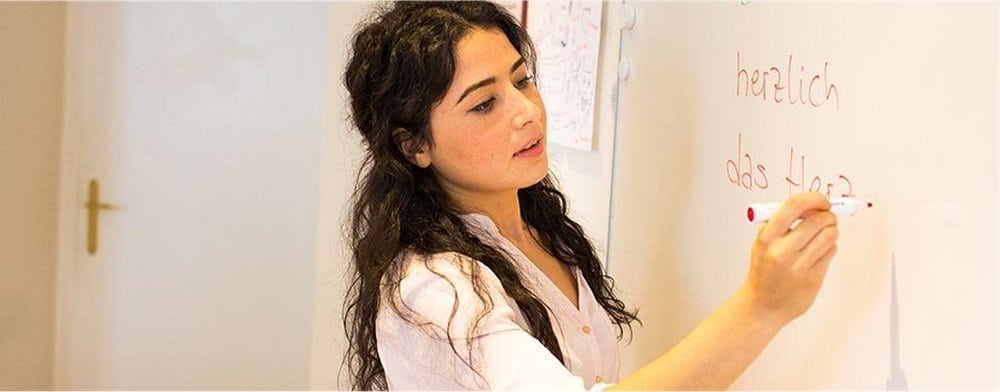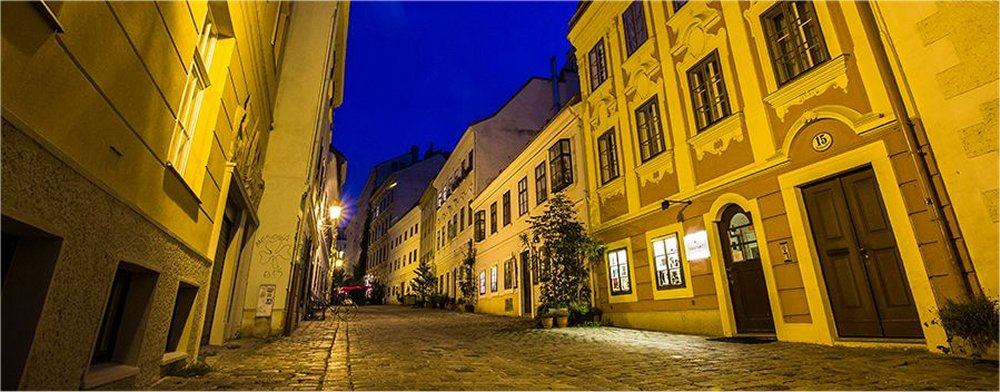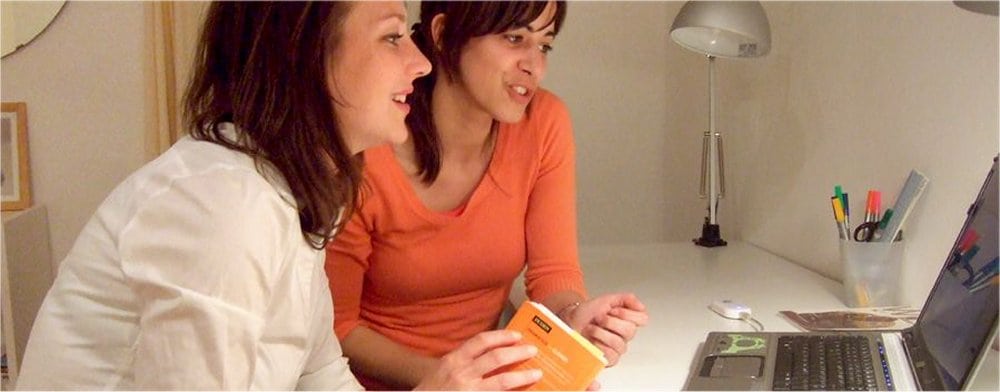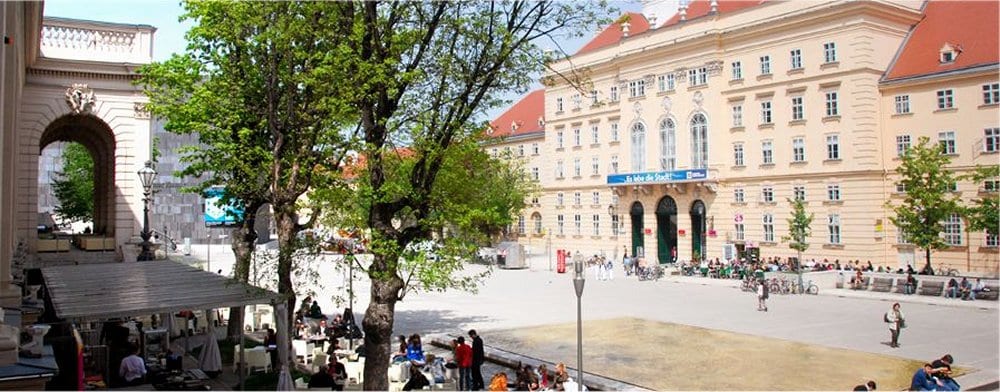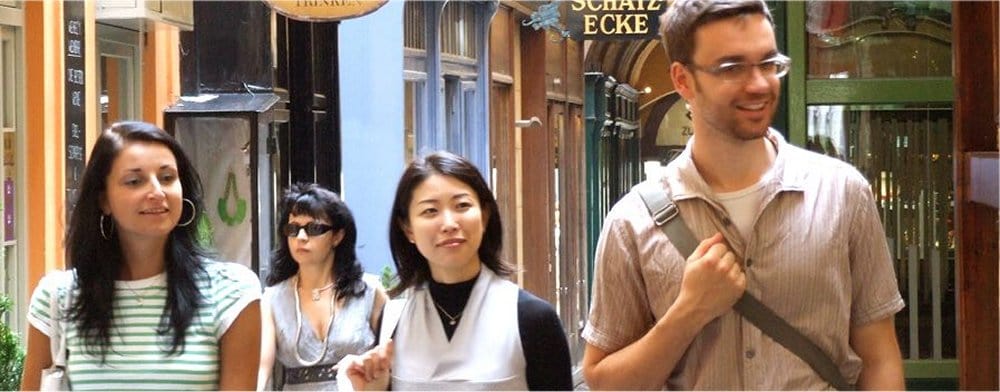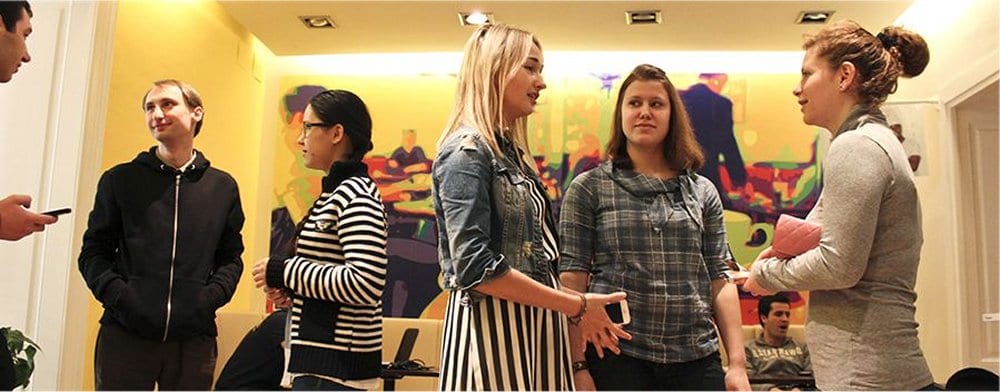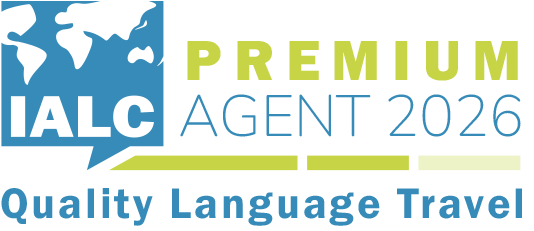Learn German in Vienna: Teaching
Let’s get you speaking German in Vienna!
German ability / Rate of Progress
Beginner / A0-A1 : Approx 4 weeks
You are a complete beginner or have very little knowledge of German. At this level you learn basic sentence structures and vocabulary to help you get simple messages across in everyday situations.
Prerequisites:
No previous German knowledge necessary. The student is a complete beginner or has very little knowledge of German.
Outline of course content:
He/she learns basic sentence structures and vocabulary to help to communicate simple messages in everyday situations. He/she learns how to introduce him/herself and to cope with simple situations in shops, at work, on the telephone, at the doctor’s and in hotels.
Elementary 1 / A1 : Approx 4 to 8 weeks
You have little knowledge of German. You learn to make simple enquiries in speaking and writing, and to give instructions. You build on your basic grammar skills and increase your vocabulary.
Prerequisites:
4 weeks of Beginner course or basic knowledge of German: ability to introduce oneself and talk about simple everyday situations.
Grammatical prerequisites:
The student has little knowledge of German, for example the ability to introduce oneself and talk about simple everyday situations.
Outline of course content:
He/she learns how to make simple enquiries in speaking and writing and to give instructions, builds on his/her basic grammar skills and increases his/her vocabulary. The following language functions are among those practised: asking the way; giving directions; asking for and giving information; discussing home and the household; describing people and their character; defining shape, size and colour of objects; asking for and giving opinions; the working world; returning faulty goods to a shop.
Elementary 2 / A2 : Approx 4 to 8 weeks
You have some knowledge of German. You learn how to express yourself adequately in familiar, everyday situations and to read and understand simple texts. Certificate (optional): “Österreichisches Sprachdiplom 1”.
Prerequisites:
8 weeks of Beginner and Elementary 1 course or good basic knowledge of German: ability to talk about everyday situations, ask the way and give simple descriptions.
Grammatical prerequisites:
Imperfect tense, Nominative, Genitive, Dative, Accusative, Adjective declension, simple Subordinate Clauses, simple Prepositions.
Outline of course content:
The student has some knowledge of German. He/she learns how to express him/herself adequately in familiar, everyday situations and to read and understand simple texts. Main course topics include: holidays and travel, living abroad, nature and the environment, family, the generation problem, population, living, the concept of home, news, politics, radio programmes.
Certificate:
Optional: “ÖSD A2 Grundstufe Deutsch”.
Elementary 3 / B1 : Approx 4 to 8 weeks
Your basic German skills are incomplete. You consolidate and revise basic grammar structures, and learn to discuss interesting topics. Certificate (optional): “Zertifikat Deutsch” or “Deutsch für den Beruf”.
Prerequisites:
12 weeks of Beginner, Elementary 1 & 2 course or very good basic knowledge of German. Understanding of everyday spoken and written situations, ability to communicate in day-to-day contexts.
Grammatical prerequisites:
Imperfect tense, Perfect tense, Nominative, Genitive, Dative, Accusative, Adjective declension, Subordinate Clauses, direct and indirect Subordinate Clauses, Prepositions.
Outline of course content:
After completing Elementary 3 the student should have a basic command of the fundamentals of German grammar and be in the position to participate in simple discussions and to understand simple texts, including the main points of short press articles. He/she consolidates and revises basic grammar structures and learns to discuss interesting topics. Main topics include: Travel & tourism, employment and the working world, school, education, history, politics & culture, literature.
Certificate:
Optional: “B1 Zertifikat Deutsch”.
Intermediate 1 / B2 : Approx 8 weeks
You have a command of the essentials of German. You practise reading, writing and discussing difficult topics and work-related issues. Certificate (optional): “Österreichisches Sprachdiplom – Mittelstufe”.
Prerequisites:
16 – 20 weeks of Beginner, Elementary 1, 2 & 3 or good German skills: problem-free and fluent communication in everyday situations, basic understanding of simple press articles and films, the ability to discuss familiar topics.
Grammatical prerequisites:
Basic command of the essentials of German grammar, in particular all tense forms, Present and Imperfect Subjunctive, Passive, Adjective declension, Subordinate Clauses & sentence structure.
Outline of course content:
The student should learn to express him/herself fluently about a variety of moderately difficult topics and without preparation. He/she learns to express his/her opinion, to state his/her views, to discuss, analyse and interpret simpler texts, to summarize them and give an account of them. The basic grammatical structures are revised again and consolidated on an intermediate level. The prerequisite is a command of basic grammar!
Certificate:
Optional after completing the course level: “ÖSD – B2 Mittelstufe Deutsch”.
Intermediate 2 / C1 : Approx 8 weeks
You have a good command of German. You learn to express yourself clearly both in speaking and writing on a large number of topics and to understand almost all texts.
Prerequisites:
28 weeks of Beginner, Elementary 1, 2 & 3 and Intermediate course or a very good knowledge of German: problem-free and fluent communication in everyday situations, understanding of newspaper articles and films, ability to converse on a number of topics. Comprehensive and sound command of the language and use of a large range of language devices.
Grammatical prerequisites:
The student must have a good command of German grammar, all tense forms, all applications of the Present and Imperfect Subjunctive, Subordination, Participle Constructions, Prepositions.
Outline of course content:
The student has a good command of German. He/she learns to express him/herself clearly both in speaking and writing on a large number of topics and to understand almost all texts. For example: Art: fine arts – interviews given by artists – interpretation of art, learning German: experiences and problems in assimilating a foreign language, sports, Austrian regional studies, Austria-Germany-Switzerland comparison, use of different types of text, literature (poetry).
Certificate:
Optional after completing the course level: “ÖSD– C1 Oberstufe Deutsch” or “C2 Wirtschaftssprache Deutsch”.
Advanced / C2 : Approx 8 weeks
You can express yourself fluently in German. You work on literary, socio-political, cultural and scientific topics. Certificate (optional): “Diplom Wirtschaftssprache Deutsch” .
Prerequisites:
36 weeks of Beginner, Elementary 1, 2 & 3 and Intermediate course or excellent knowledge of German: problem-free and fluent communication in situations of all kind, understanding of complex written and oral passages of all kind, the ability to discuss complex topics. Comprehensive and sound command of German and use of a large range of language devices.
Grammatical prerequisites:
The student must have a very good command of German grammar.
Outline of course content:
The student can express him/herself fluently in German. He/she works on literary, socio political, cultural and scientific topics.
Certificate:
Optional after completing the course level: “C2 Wirtschaftssprache Deutsch”.
Teaching methods in Vienna
One of the college’s fundamental principles is to ensure you maximise your spoken communication.
It is important to vary teaching methods as much as possible in the German courses. Since every group is different, teachers take an individual approach to each group and flexibly adapt their teaching methods to students’ respective learning needs.
The basic programme provides intensive coaching in grammar, sentence structure and vocabulary. Reading and listening comprehension as well as written exercises are important components of the German courses. One of the basic principles is to ensure a maximum of oral communication. You are encouraged to practice your spoken German with your teacher and with your classmates. Another course aim is to enable you to self-study after finishing your course.
You are encouraged to practice your spoken German with your teacher and with the other students at all times! The basic programme provides intensive coaching in grammar, sentence structure and vocabulary building. Both reading and listening comprehensions, as well as written exercises are important components of the courses. The college have developed their own teaching materials and use a wide range of modern teaching aids, such as computers, CDs and DVDs. Students are encouraged to use the multimedia library to reinforce their studies and cultural sessions are offered as part of the programme to provide you with an insight into the culture, literature and regional issues that provide your new-found language skills with a meaningful context.
The college divides students into seven theoretical levels of ability. A student of average linguistic ability should allow between four to eight weeks to complete each one of the following levels; Beginner, Elementary I, II or III, Intermediate I or II and Advanced. In reality a student chooses to attend a short course or a longer German “Languages for Life” programme according to their linguistic goals, personal wishes and time constraints.
Private Tuition
Participants can decide on the content of their private tuition themselves or ask their teacher to devise a programme most suited to their needs.
Level Test
To enable the school to tailor their teaching to your level of attainment, they ask that you take the School Assessment Test before course commencement. The written assessment test takes approximately 60 minutes and covers grammar, reading comprehension and writing skills. As soon as you have booked your course, you will be able to take the assessment test on line and we shall have your on line test results ready when you arrive in Vienna!
Class Materials
The school use textbooks by the publishers Hueber and Langenscheidt and complement them with their own authentic material. Courses follow accepted curricula, from Beginners to Advanced. The school offer modern teaching materials and equipment. Computers, DVDs and CDs are among the aids used in tuition and sessions devoted to culture, regional studies, literature and business. Students can use the multimedia library and computer facilities, which is a good way of adding to and reinforcing the skills acquired in class.
End of Course Certificate
An evaluation test every Thursday allows the school to check on your progress.
If you have attended your course regularly (at least 80%), you will receive a certificate of participation giving details of the type of course, duration, course level and number of lessons attended. Grades are awarded for the level of proficiency attained if the school tests have been completed.
Levels and groups
The school offer seven course levels, each with a 4-8 week syllabus. Levels start at absolute Beginner and progress to Advanced. It is the responsibility of the teacher to decide whether a student may proceed to the next level. Weekly tests aid this decision. If a student’s skills are incompatible with those of the rest of the group, it is naturally also possible to switch levels mid-course after consulting the school management.
Class Size
The smaller your learning group, the more personalized your course will be. The maximum amount of students per group is nine, except Culture which is open-class style. The average number of students per group is five/eight in low season and seven/ten in high season, with a maximum of 12 students per class.
Class Duration
We are quite strict about classes starting punctually so no class time is lost. At the school in Vienna, lessons run from Monday to Friday and are 45 minutes long.
Exam Preparation: OSD
The Austrian German Diploma (OSD), which is advocated by the Austrian state, boasts 120 examination centres in 30 countries and enjoys worldwide recognition for its German as a foreign language examinations.
The Vienna school is an official examination centre for the Austrian German Diploma (OSD).
• A2-Grundstufe Deutsch, GD *
The candidate is able to communicate in everyday situations on an elementary level. This certificate is sufficient proof of your German skills if applying for permanent residency or Austrian citizenship.
Course level: Elementary 2 (A2)*.
•B1-Zertifikat Deutsch, ZD *
The Zertifikat Deutsch is a joint certificate of OSD, the Goethe Institute, WBT and Fribourg University. This certificate is widely recognized by employers as sufficient evidence of proficiency in German and improves your chances of success on the job market.
Course level: Elementary 3 (B1)*.
• B2-Mittelstufe Deutsch, MD *
The candidate can communicate spontaneously and fluently with native speakers of German about a broad spectrum of topics. The certificate is accepted by some Austrian universities as sufficient proof of German language skills for admittance to studies.
Course level: After completing Intermediate 1 (B2)*.
• C1-Oberstufe Deutsch *
C1 Oberstufe Deutsch is accepted by Austrian and some German universities as sufficient proof of German language skills for admittance to studies.
Course level: After completing Intermediate 2 (C1)*.
• C2-Wirtschaftssprache Deutsch, WD *
OSD in conjunction with the Austrian Chamber of Commerce. For students who are conversant with business topics.
Course level: For students who are conversant with business topics, after completion of Advanced (C2)*.
The school offers special Certificate Preparation Courses!
Get information on OSD certificates in comparison to the European Framework!
*Our course levels as compared to the Common European Framework of Reference as issued by the European Commission that is the basis for the advancement of European multilingualism.
First Day
You are expected to be at school at 8.00 a.m. on Monday for the allocation of your course.
Please take the on-line placement test at least one week prior to the commencement of your course. On the first day of school you will have a short oral assessment talk, which takes a maximum of 5 minutes. You will be assigned to your class level, based on the results of your on-line test and oral assessment.
You will receive books and other relevant documents at school. We recommend you bring a dictionary. You are informed of your exact schedule on the first day of classes. You will have lessons either in the morning or in the afternoon, depending on your course level. On the first day of your course you are given a welcome kit. It contains a student manual with loads of information on Vienna, sightseeing, leisure, sports and useful tips. It also contains your personal Student Card, which entitles you to a number of discounts at various museums, theatres, restaurants and shops. You can find a daily programme for the city (cinema, theatre, concerts,..) in every newspaper. A monthly calendar of events is available at the school.
Sample Timetable
| Standard Course |
| 09:00 – 10:30 a.m. class 10:30 – 10:45 a.m. break 10:45 – 12:15 p.m. class or 02:15 – 03:45 p.m. class 03:45 – 04:00 p.m. break 04:00 – 05:30 p.m. class |
| Intensive Course |
| (additional lessons in mini groups) |
| 12:30 – 02:00 p.m. class or 05:45 – 07:15 p.m. class |
Choice of timetable determined by School Staff according to student language levels, rather than student choice.
Vienna School Teachers
Each group is taught by two (Standard Course) or three (Intensive Course, Super-Intensive Course, Business German) teachers a day in order to ensure more varied and stimulating instruction. Participants are made familiar with different styles of teaching, teacher personalities and variations in pronunciation of modern German.
Our teachers see themselves as your friends and partners. They are native speakers of standard German, and they take genuine pleasure in working with you. They are highly qualified and regularly attend training courses held by the school.
Vienna School Students
Students come from all over the world, predominantly Europe, but also from as far afield as Australia, China, Japan and the USA. Fundamentally, if you want to learn German – you’re welcome. Age wise, there are a real mix of students (many are 16 yrs to 25 yrs of age), but older students are common, and most welcome, and a significant minority of student are over 30 yrs of age. There are students that stay for one or two weeks and others who stay for 12 to 36 weeks. The longer you stay the better your German language skills will be!
